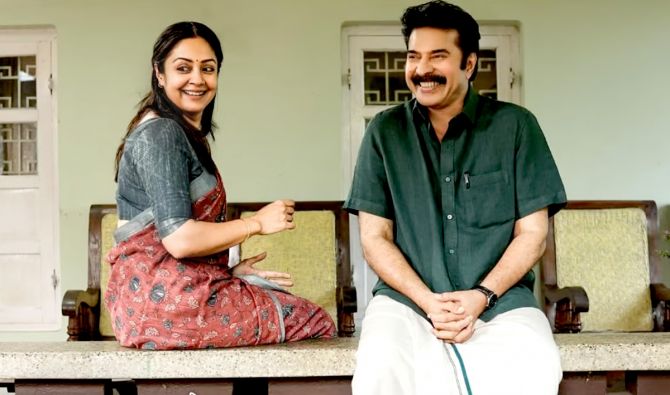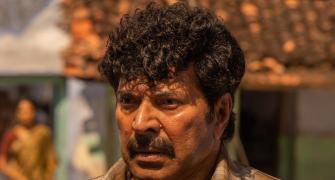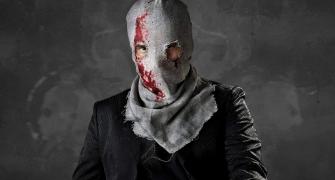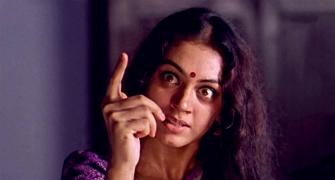'As I watched Mammootty 'try out' Mathew Devassy, I could hear from my theatre seat the ready-made appreciation of the liberal press, their applause for the great actor having flirted with queerness on screen.'
'But it is a flirtation and nothing more, for I could not detect in Devassy any hint of love, not for his homosexual lover, not for his wife,' observes Sreehari Nair.

After watching his latest, Kaathal, I have changed my mind about Jeo Baby.
I used to think of him as a pounder with iron fists.
I now see him as a button pusher with velvet gloves.
Though he continues to be a student of the School of Resentment, it may just be that he has become less insultingly robust.
For starters, this time around, Baby tries really hard (and the strain is evident) to not make a 'thesis film' like The Great Indian Kitchen.
Kaathal has as its centerpiece a juicy incident but it does not wish to squeeze the life out of this incident.
So Mammootty plays Mathew Devassy, a dabbler in small-town political judo, who gets outed by his wife as a homosexual, in the same week that he announces his candidacy for an upcoming election.
This is a sensationalist premise, but the film is essentially about what happens next in Mathew's Christian village in Pala, Kerala, amid a combinational theme of Bible verses, hymns, speechifying and slowly melting candles.

Above all else, Kaathal has anticipated its potential critics as well as its potential patrons, and it wants to trip them both.
Getting an Indian superstar (one of the greatest) to play a homosexual would have granted Jeo Baby the license to indulge in dignified muckraking but for the most part, Baby and his writers are careful about not taking the easy way out.
The narrative, for instance, does not rush towards its juicy inflection point. We follow the trivialities and annoyances of two men before their storylines delicately converge, and it's revealed to us that the men are, in fact, lovers.
Once this is established, you don't get a chance to become self-righteous about mean-spirited villagers and unfeeling religious heads (which is the response that such narratives typically attempt to evoke in the viewer).
Mathew Devassy and his homosexual lover are not turned into forces pitted against society; if anything, they are shown to be members of a society in which 'thinking progressively' is seen as a tool for success. (A different sort of tragedy, though I don't think Jeo Baby would agree with me).

It took me some time to understand that this is a world of overcast mid-mornings and melancholic rubber plantations, a world in which even villainy is innocent.
The prejudice against the two homosexuals, the nominal catcalling and stuff, are presented as part of the small-town's everyday texture.
There's a heckling bit set in the town square, where you hear someone passing an anti-gay slur, but it does not help you feel virtuous. As a matter of fact, the slur in question has the rhythm of great gossip, and sounds like a whip of the loveliest wit.
There is a scene of an election rally speech, where a local politician from Mathew's Opposition party makes sport of his sexuality.
This scene has been staged in a way that makes it impossible for you to have a smug handle over the proceedings, and the character making the speech gets so lost in his own theatre that you end up applauding his performance rather than patting yourself for having the right perspective on things.
To shade matters further, a young bishop of the church is shown passing by on his motorcycle without paying any attention to the speech-maker -- and though a minor detail, it goes a long way in making the setting alive for us.
If this is an issue movie, it is salvaged by such asides, by the realisation that even during moments of 'grand importance', there's life unfolding elsewhere with all its imperfections, and at its usual, awkward pace.
A half-open packet of Malabar Parotta and a half-consumed bottle of rum are placed beside a young man making a crank call to Mathew's wife -- and this detail, somehow, lends the whole scene a mysterious dignity.
When Mathew's wife, Omana (Jyothika seems programmed to act unflappable), is called over to the witness box to give her testimony, she fumbles for a few seconds, not sure about what to do with her handbag, before entrusting it to Mathew, from whom she is seeking a divorce.
As Omana delivers her testimony, Mathew stands next to her, frozen, completely emasculated by his wife, but still holding on to her handbag.

The court scenes, though they begin promisingly enough, are also the auspices of Jeo Baby's aesthetic weakness.
If a pamphleteering heart is his constant companion, the camera is his enemy.
The clunky close-ups granted to the two lady lawyers, together with the forced spattering of English, plunge Kaathal into the very depths of a TV movie. I even had the weird sensation that Baby was using the lawyers to talk about everything he had been itching to say on a television debate.
From this point on, the characters' homosexuality starts to receive fulsome cinematic approval, meted out through swooning music, rain, and flower children doing their painful pirouettes.
While the film's tough-minded approach in the initial sections masks its deadening solemnity, the fiend does come to the surface eventually.
Jyothika's Omana is the chief ambassador of this solemnity, although the character hardly becomes anything more than a conduit for Mathew embracing his sexuality.
Omana is written as a clinical planner of an exposé, and every Bible verse she quotes ('Virgin of Virgins...') and every domestic remark she makes ('If you don't have these Vattayappams today, they won't be good for consumption tomorrow...') sounds like a veiled protest against the sexless life she has been forced into leading.
A no-nonsense spy of the hearth is what Omana is, and if she is hurting on the inside, if she is roiling, the terrible dubbing won't let us in on this secret.
Though she's like a batter that threatens to rise but never does, Jyothika can be credited with setting off Mammootty's finest moment in the picture.
It happens when Omana asks Mathew for one final night of tenderness, and he looks up to the heavens and cries out, 'Dear God!' Like Brando's ironic invocation of God in the opening stretch of Last Tango in Paris, Mathew's wail is both a wail and a curse -- but most importantly, it is a reminder of how direct' and 'immediately appealing' Mammootty can be.
This fact must be repeated over and over again because his mirthless interpretation of this character, as someone who has allowed his homosexuality to become the reason for his humility, keeps you at arm's length.
Mathew Devassy, I am sure, will be read as part of Mammootty's recent efforts at demystifying the Indian Superstar: A commendable aspiration to have in a country where feasting on accumulated stardom is considered the smart thing to do.
While the intention may be to wipe the slate clean and start fresh meanings, the only Mammootty movie of the last three years that has actually delivered on the promise is Nanpakal Nerathu Mayakkam -- which was, if you think about it, an oblique tribute to the actor's career, his craft, and his popular image among the cine-crazy public.
As I watched Mammootty 'try out' Mathew Devassy, I could hear from my theatre seat the ready-made appreciation of the liberal press, their applause for the great actor having flirted with queerness on screen.
But it is a flirtation and nothing more, for I could not detect in Devassy any hint of love, not for his homosexual lover, not for his wife, not for his armchair-bound father who nibbles away at his waning days.
But probing love, probing its contradictions, the wounds it inflicts and the messiness it leaves in its wake, can never be the concern of a socially-minded film-maker like Jeo Baby, for whom respect is paramount, and paramount is a prejudice-free society where the homosexual wins or the overworked wife breaks through.
And yet, a real artist's subject is always love; whether he explicitly says so or not.
Biju Menon's character in Thankam is driven to total self-delusion and disbelief when informed that his friend (played by Vineeth Sreenivasan) had killed himself. That was an expression of one heterosexual man's love for another heterosexual man.
In Kaathal, prejudices of all kinds may be conquered, but the film never gives us an idea of Mathew Devassy's bond with his lover.
They surely must have come across as bosom buddies, before the true nature of their relationship was revealed to the world.
I am not asking for a flashback or an exposition, but where are the echoes of the history they have shared, if at all?
What is the basis of their chemistry, if any?
No, these questions do not matter in the Jeo Baby universe; for it is a universe where there are no lovers by instinct, only lovers for a cause.









